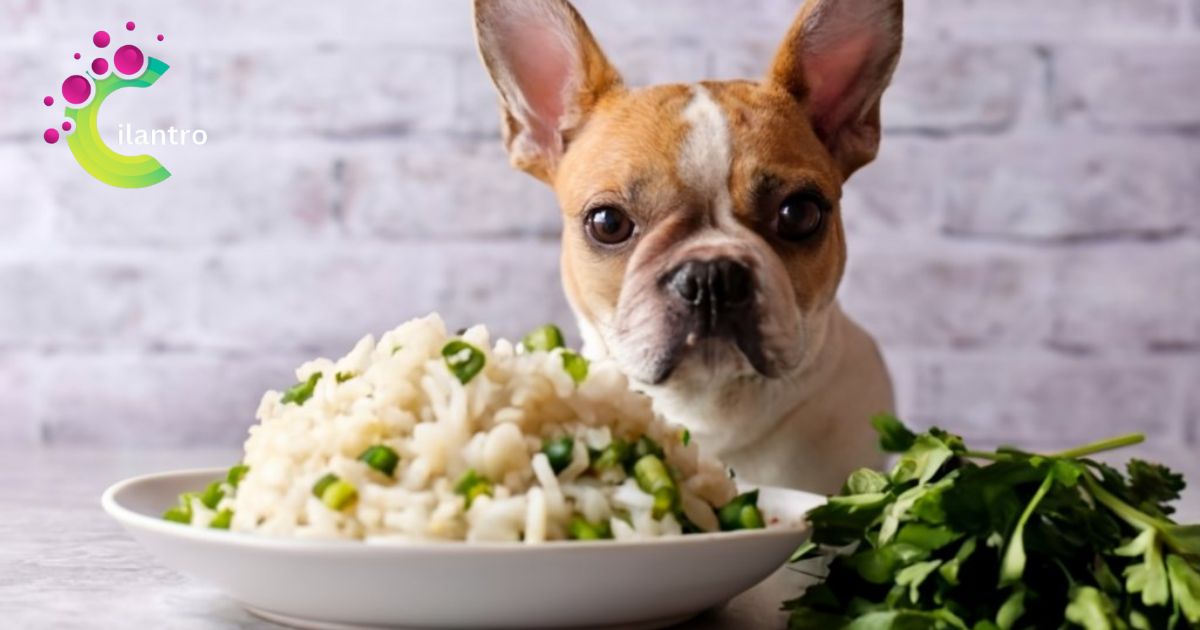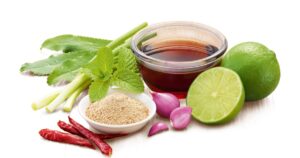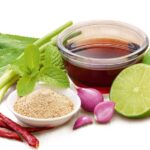Dogs can eat cilantro lime rice in moderation, but it’s crucial to ensure the dish contains no harmful ingredients like garlic or onions. Before introducing any new food into your dog’s diet, consult with a vet for guidance on their nutritional needs and potential allergies.
Indulge your furry friend in a culinary adventure with our special treat. The question is, can dogs eat cilantro lime rice? Yeah, sure. Savor the delightful blend of cilantro and lime, which creates a tail-wagging sensation. Treat your pup to a tasty twist that will make mealtime unforgettable. Join the flavorful journey where dogs indulge in a tasty twist to their usual treats because in this tale, dogs not only fetch but also feast on cilantro lime rice.
Cilantro lime rice can be harmful to dogs due to certain ingredients. These ingredients can lead to digestive issues, lethargy, or even more severe conditions. Plain cooked rice without additives is a safer option for dogs. Always consult your veterinarian before introducing new foods to your dog’s diet. Prioritize their health and well-being by being cautious about the ingredients in human food shared with pets. In this article, we discuss more interesting things, so stay tuned with us!
What is Cilantro Lime Rice?
Cilantro Lime Rice is a delicious dish that combines the zesty taste of lime with the fresh, vibrant flavor of cilantro. Picture fluffy white rice infused with a citrusy kick and the aromatic essence of cilantro leaves. This dish is a perfect side for various meals, adding a lively twist to your dining experience.
Treat your taste buds to a feast of flavors with cilantro lime rice The question is here, Can dogs eat cilantro lime rice? It’s important to note that certain ingredients in this dish may not be suitable for our furry friends. This delightful combination brings a burst of citrusy and herby goodness to your taste buds.
Is Cilantro and Lime Safe for Dogs?
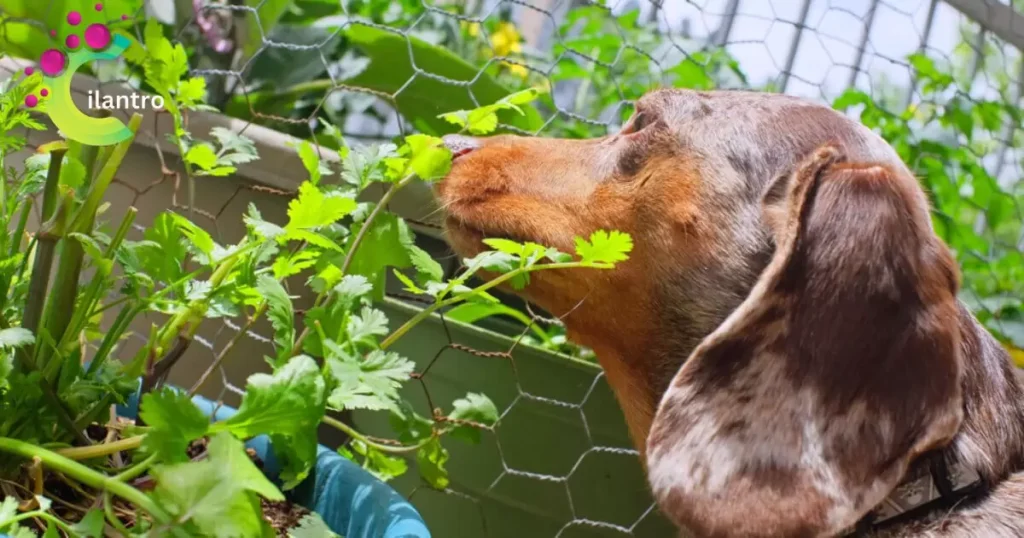
Cilantro and lime are generally safe for dogs in moderation. Can Dogs Eat Cilantro Lime Rice? Yeah, sure. Cilantro is rich in antioxidants and can offer some nutritional benefits, while lime can provide a burst of vitamin C. However, both should be given in small amounts, as excessive consumption may lead to digestive upset. It’s important to remove any seeds or pits from the lime, as they can be a choking hazard.
Some dogs may be sensitive to citrus fruits, oregano and cilantro, so monitor your pet for any adverse reactions, such as an upset stomach or allergies. Always consult with your veterinarian before introducing new foods to your dog’s diet to ensure they are safe based on your specific dog’s health and dietary needs.
Rice and Dogs
Rice is generally safe for dogs and can be a part of a balanced canine diet, providing essential carbohydrates. However, it’s crucial to ensure the rice is plain and cooked without additives like salt or spices. Introducing rice gradually can help prevent digestive issues.
It is best to consult with a veterinarian to determine the ideal portion size for your dog’s specific requirements. Always prioritize a well balanced diet to meet your dog’s nutritional requirements.
Can Dogs Eat Rice?
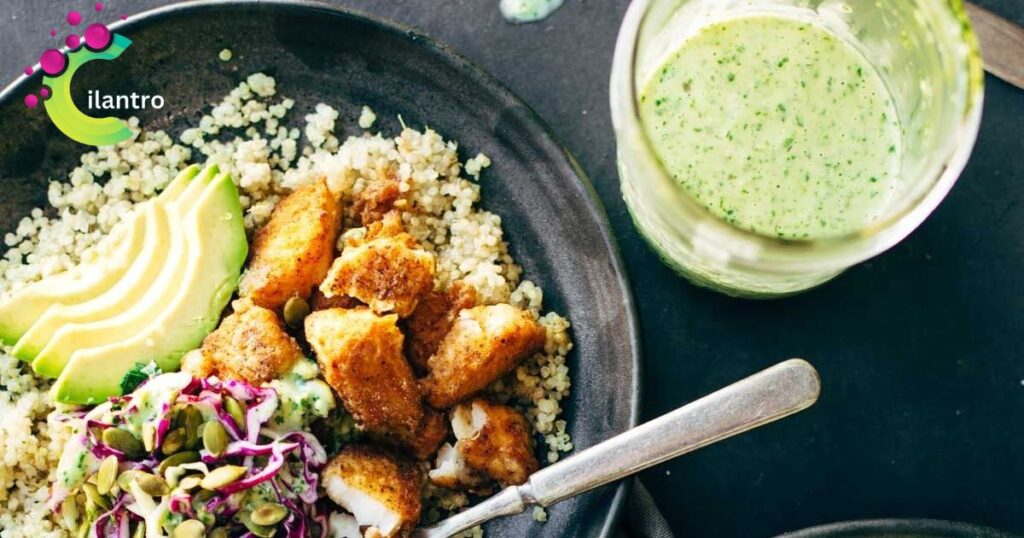
Yes, dogs can eat rice. Plain, cooked rice is safe for dogs to consume in moderation. It provides a good source of energy and is easy to digest. Ensure the rice is plain and free from additives like salt or seasonings. Brown rice is a healthier option due to its higher nutritional content.
Introduce rice gradually into your dog’s diet to avoid any digestive issues. Always consult with your veterinarian to determine the best dietary choices for your dog. Remember, moderation is key when adding new foods to your pet’s meals.
Rice as a Staple in Many Commercial Dog Foods
Rice serves as a common staple in many commercial dog foods due to its easily digestible nature and nutritional benefits. It provides a source of carbohydrates that can supply energy for dogs, supporting their active lifestyles.
Rice is gluten free, making it suitable for dogs with certain dietary sensitivities. Its mild flavor and texture make it palatable for most dogs, contributing to the overall appeal of commercial dog food products.
Nutritional Benefits and Considerations for Canine Consumption
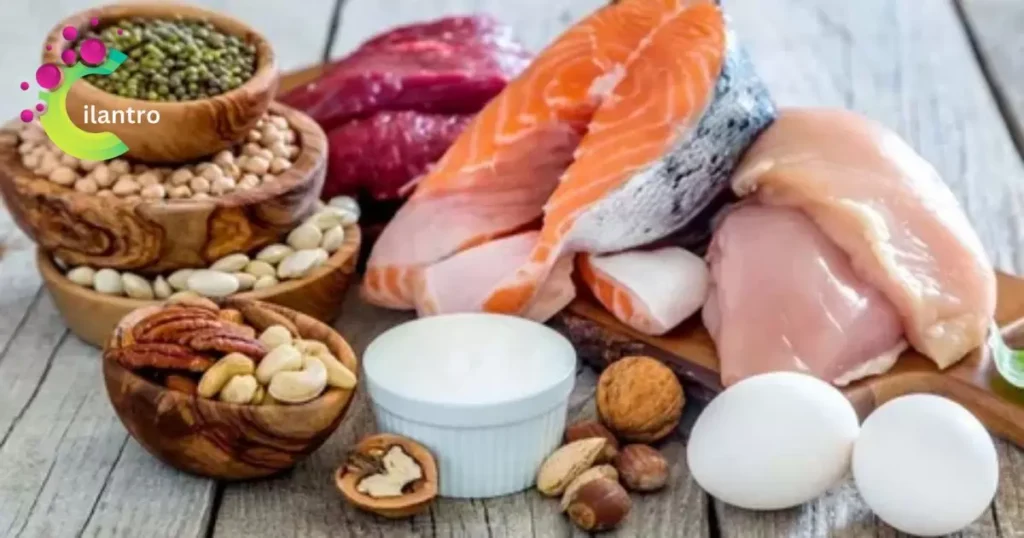
Nutritional considerations are crucial for the well-being of dogs, as their dietary needs differ from those of humans. A balanced canine diet should include essential nutrients such as proteins, fats, vitamins, and minerals, promoting optimal health and energy levels. High-quality commercial dog foods are formulated to meet these requirements.
It’s important to avoid feeding dogs certain human foods that can be harmful, such as chocolate, onions, and grapes. Tailoring a dog’s diet to its age, size, and activity level is key to addressing individual nutritional needs. Regular veterinary check-ups and consultation with a professional can help ensure a well-rounded and suitable diet for canine companions.
Risks Associated with Feeding Dogs
Feeding dogs improperly can lead to nutritional deficiencies, obesity, and digestive issues. Certain human foods, such as chocolate, onions, and grapes, pose serious health risks for dogs and should be avoided. Inconsistent portion control and feeding practices may contribute to long-term health issues, emphasizing the importance of a balanced and appropriate diet for canine well-being.
Precautions of lime rice for dogs
| Precaution | Explanation |
| 1. Avoid Excessive Quantity | Do not feed large amounts of lime rice to dogs. Moderation is key to preventing digestive issues. |
| 2. Plain and Unseasoned | Ensure that the lime rice is plain and without any seasonings, spices, or additives. |
| 3. Check for Allergies | Introduce lime rice gradually and monitor for any signs of allergies or adverse reactions. |
| 4. No Garlic or Onions | Avoid adding garlic or onions to the lime rice, as these ingredients can be toxic to dogs. |
| 5. Watch Sodium Levels | Keep an eye on sodium content, as excessive salt can lead to sodium ion poisoning in dogs. |
| 6. Monitor Citrus Intake | While a small amount of lime is generally safe, excessive citrus fruit can upset a dog’s stomach. |
| 7. Consult with a Vet | Before introducing new foods, especially if your dog has health issues, consult with a veterinarian. |
| 8. Remove Bones and Pit | If using lime slices, remove any seeds or pits to prevent choking hazards or digestive issues. |
| 9. Consider Dietary Balance | Lime rice should be part of a balanced diet; ensure it doesn’t replace essential dog nutrients. |
| 10. Watch for Digestive Issues | Monitor your dog for any signs of digestive problems such as vomiting, diarrhea, or discomfort. |
Note: Always consult with your veterinarian before making significant changes to your dog’s diet or introducing new foods, including lime rice. Each dog’s dietary needs may vary based on factors such as age, weight, and health conditions
Cilantro Lime Rice ingredients with recipe for dogs
While dogs can enjoy some plain cooked rice in their diet, it’s important to note that cilantro and lime may not be suitable for all dogs. Dogs have different tolerances and sensitivities to various foods, and certain ingredients can be harmful to them.
That being said, here’s a simple recipe for plain cilantro lime rice for dogs:
Simple Ingredients
1 cup cooked white rice (plain, without any added seasonings or spices)
1 tablespoon fresh cilantro, finely chopped
1 teaspoon fresh lime juice
Instructions
- Cook the rice according to the package instructions. Make sure not to add any salt, spices, or seasonings.
- Once the rice is cooked and cooled to room temperature, transfer it to a mixing bowl.
- Add the finely chopped cilantro to the rice.
- Squeeze fresh lime juice over the rice and cilantro.
- Mix the ingredients well to distribute the cilantro and lime juice evenly.
- Serve a small portion of this cilantro lime rice as a treat or mix it with your dog’s regular food.
Remember to consult with your veterinarian before introducing new ingredients into your dog’s diet, as each dog may have unique dietary restrictions or allergies. It is critical to ensure that any additions to their meals are safe and beneficial to their overall health.
Nutritional Content and Potential Benefits for Dogs
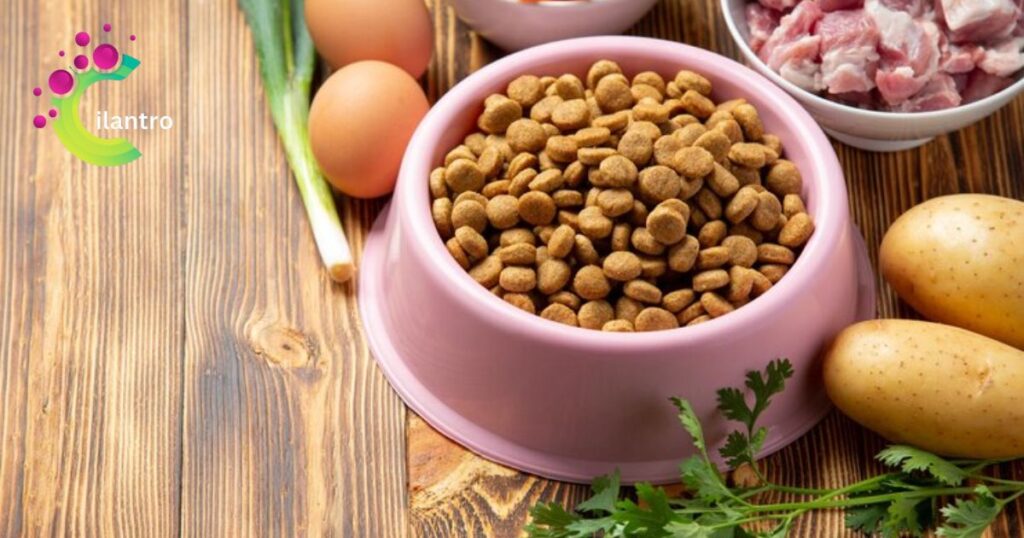
The nutritional needs of dogs vary based on factors such as their age, size, breed, and overall health. Here are some general guidelines regarding the nutritional content and potential benefits for dogs:
Protein
Dogs require a significant amount of protein for muscle development, maintenance, and overall health. Sources of high-quality protein include meat, poultry, fish, eggs, and plant-based sources like soy and legumes.
Fat
Fats are essential for providing a concentrated source of energy and supporting healthy skin and coat. Good sources of fat for dogs include meat, fish, and oils like salmon oil or flaxseed oil.
Carbohydrates
Carbohydrates provide energy, and while dogs don’t have a strict requirement for carbohydrates, they can be part of a balanced diet. Common carbohydrate sources include grains like rice, corn, and wheat, as well as vegetables and fruits.
Vitamins and Minerals
Dogs need a range of vitamins and minerals for various bodily functions. Commercial dog foods are formulated to meet these requirements, but some fresh fruits and vegetables can also contribute to a well-rounded diet.
Calcium and Phosphorus
Essential for bone health, these minerals should be present in appropriate ratios in a dog’s diet. Puppies, in particular, need a balanced calcium-to-phosphorus ratio for proper bone development.
Water
Adequate hydration is crucial for dogs. Always provide access to clean and fresh water.
The potential benefits of a well-balanced diet for dogs include
A well-balanced diet for dogs supports overall health by providing essential nutrients like proteins, vitamins, and minerals. It promotes proper growth, maintains a healthy weight, and contributes to a strong immune system. It can enhance coat conditions and energy levels in dogs.
Healthy Weight Maintenance
Proper nutrition helps prevent obesity, which can lead to various health issues.
Shiny Coat and Healthy Skin
Essential fatty acids contribute to a lustrous coat and overall skin health.
Digestive Health
High-quality, easily digestible ingredients support a healthy digestive system.
Strong Immune System
Proper nutrition supports a robust immune system, helping dogs resist illness.
Joint Health
Some diets include ingredients like glucosamine and chondroitin to support joint health, especially in older dogs or breeds prone to joint issues.
It’s important to note that individual dogs may have specific dietary requirements or health conditions that necessitate a tailored diet. Always consult with a veterinarian to determine the best nutrition plan for your dog based on their unique needs and circumstances.
Incorporating Variety into a Dog’s Diet
To truly cater to a dog’s nutritional needs, embracing diversity in their diet is paramount. Much like humans, dogs benefit from a mix of proteins, vegetables, and grains, ensuring a well-rounded intake of essential nutrients.
Rotating between high-quality commercial dog food, lean meats, and wholesome vegetables not only prevents dietary deficiencies but also stimulates their taste buds. Including occasional treats like blueberries or carrots adds both flavor and additional health perks.
A varied diet supports digestive health, helps prevent allergies, and promotes overall vitality. By introducing a spectrum of ingredients, pet owners can embark on a culinary journey that fuels their canine companions with both satisfaction and optimal nutrition.
Potential Concerns or Allergic Reactions
It is a vigilant understanding of individual sensitivities. Like a personalized fingerprint, our bodies respond uniquely to various stimuli. Monitoring symptoms and consulting medical professionals ensures a tailored approach to mitigating any unexpected reactions, fostering a proactive and individualized approach to well-being.
FAQ’s
Can dogs have cilantro lime rice?
It’s generally safe for dogs to have plain cooked rice, but cilantro lime rice may not be suitable due to potential toxicity from ingredients like garlic and onions.
Is lime or lemon good for dogs?
Lime and lemon are not recommended for dogs, as they can be toxic and cause digestive issues.
Can cilantro and lime rice be a regular part of a dog’s diet?
Cilantro lime rice is not recommended as a regular part of a dog’s diet, as dogs generally thrive on a balanced and nutritionally complete canine diet.
Can dogs have allergies or sensitivities to cilantro lime rice?
Yes, dogs can have allergies or sensitivities to cilantro, lime, and rice, just like cilantro or spices may cause adverse reactions in some dogs.
Can dogs eat dried cilantro?
It’s generally safe for dogs to eat dried cilantro in moderation, but large amounts may cause digestive upset.
What seasonings are safe for dogs?
Safe seasonings for dogs include plain, cooked meats, vegetables like carrots or peas, and small amounts of dog-friendly herbs like parsley or basil.
Conclusion
Feeding your dog cilantro lime rice should be approached with caution. Can dogs eat cilantro lime rice? It’s important to approach this culinary choice with caution. While plain rice is generally safe for dogs and can provide a bland diet during digestive issues, incorporating cilantro and lime raises concerns. Dogs can eat plain cooked rice in moderation, as it is easily digestible and can help with mild stomach upset.
Cilantro contains oils that might upset your dog’s stomach, and lime can be too acidic for their digestive system. Moreover, some dogs may be sensitive to certain herbs or citrus flavors. It’s crucial to avoid seasonings, spices, and additives like salt or garlic, as they can be harmful to dogs. Before introducing new foods like cilantro lime rice to your dog’s diet, consult with your veterinarian to ensure they remain safe and healthy. Always prioritize your dog’s well-being by offering a balanced and vet-approved diet.

Meet our website’s admin, a culinary enthusiast dedicated to curating delectable food ideas. With a passion for gastronomy, they expertly craft and present a diverse array of recipes, tips, and inspirations, making our platform a go-to destination for culinary creativity.
